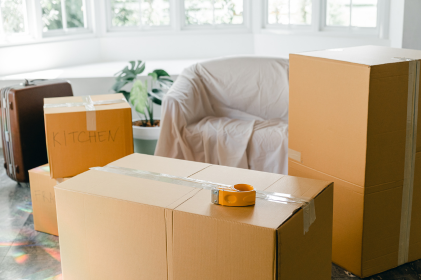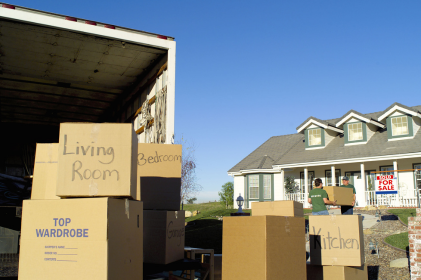Moving into a new home is an exciting adventure, but it can also be a challenging process – especially if you aren’t properly prepared for it! We’re here to make your move as easy and painless as possible. Now that you’ve found a new place to call home, these essential moving tips will help you navigate your move smoothly so you can get to the good part; enjoying your new space with your family.
Timing is Everything: Your Moving Timeline
Creating a detailed timeline is absolutely crucial for a smooth move. Here’s a comprehensive guideline to help you plan:
- Get Your Possession Date: Understanding when you can officially move into your new home is one of the most important pieces of information you’ll need to know. This date is usually defined in your closing documents. Make sure to coordinate with your real estate agent to confirm this date well in advance so you can plan everything else around it.
- Plan Your Move-Out Date: Determine the date by which you need to vacate your current property. If you are renting, this will typically be based on your lease agreement. If you are selling, this will be coordinated with the closing date of your sale. Make sure there is enough time between your move-out and move-in dates to handle any unforeseen issues. If possible, plan for a few days of overlap between your current home and your new home to handle any unexpected delays.
- Identify Available Moving Days: Consider your work schedule, school schedules, and any other commitments when choosing your moving days. Weekends might be more convenient but could be more expensive if hiring movers. Make sure you have a few days’ buffer to account for any delays. Don’t forget to plan for additional time if you need to clean or repair your old home before handing it over.
- Schedule Help or Book a Moving Company: Decide if you’ll be moving yourself or hiring professionals. If you’re hiring a moving company, book them at least 4-6 weeks in advance. If you’re relying on friends and family, start coordinating with them early to ensure their availability.
- Start Packing Early: Begin packing non-essential items 4-6 weeks before your move. Pack one room at a time to stay organized and avoid confusion and gradually work your way up to everyday items as the move date approaches.
- Book Cleaning Services: Determine if you need professional cleaning services for your old and/or new home – this is a great way to avoid extra stress and ensure both spaces are ready to go if needed. Scheduling these services at least 2-3 weeks in advance ensures availability and allows you to move into a clean space.
- Set Up Utilities: Contact utility providers to schedule the activation of electricity, water, gas, internet, and other essential services at your new home. Aim to have these services set up a few days before your move-in date to ensure everything is ready when you arrive. Contact service providers at least two weeks before your move to ensure a smooth transition.
- Paint Before Unpacking: If you plan to paint your new home, do it before you move your furniture in. This will save time and effort later. Schedule painting for the days immediately following your possession date but before your main move-in day.
Decluttering: What to Bring and What to Leave Behind

Decluttering can make your move easier and more efficient. Here are some tips to help you decide what to keep and what to leave behind:
Sort Your Belongings: Go through each room and categorize your items into keep, donate, sell, or discard. This process can take a few weeks, so start early. Be ruthless with items you haven’t used in over a year – if you haven’t needed them yet, you likely won’t miss them!
Use the Three-Box Method: Label three boxes for each room: one for items to keep, one for items to donate or sell, and one for items to toss. This method keeps you organized and ensures you only bring what you truly need to your new home. Involve family members in the decluttering process to share the workload – this can be a fun way to get the kids involved in the moving process!
Donate or Sell Unwanted Items: Items in good condition that you no longer need can be donated to local charities or sold online. Organize a garage sale to get rid of unwanted items and earn some extra cash for your move. Online marketplaces like Kijiji and Facebook Marketplace can also be useful tools when it comes to selling valuable items.
Handle Sentimental Items: Sentimental items can be the hardest to part with. You may want to create a memory box for small, sentimental items, or take photos of items you want to remember but don’t need to keep. Store sentimental items in a special box or trunk to keep them safe and organized.
Packing Essentials: Gear Up for a Smooth Move
Having the right supplies can make packing, moving, and unpacking so much easier. Here are some important things you’ll need along the way:
- Boxes:You’ll need various sizes of boxes for different items. You can get them from local stores, online marketplaces, or moving companies. Plan on getting more boxes than you think you’ll need to avoid last-minute runs to the store when you’re tight on time. Check with local grocery stores, the LCBO, or other retailers for free boxes that they no longer need. Eco-friendly packing options like reusable plastic bins are also a great option and can be reused for storage afterwards.
- Packing Tape: Pick up good-quality packing tape to securely seal your boxes. Poor-quality tape can break or lose its stickiness, leading to potential damage. Make sure to double-tape the bottom of heavy boxes to prevent them from breaking open.
- Bubble Wrap:Protect fragile items with bubble wrap to keep them from getting broken along the way. You can also use newspaper, but bubble wrap provides better protection for breakable items.
- Markers:As you pack, label each box with its contents and the room it belongs to. Colour-coding by room can add another layer of organization.
- Newspaper/Packing Paper:Use packing paper to wrap items and fill empty spaces in boxes to prevent shifting during transit. Reusing old newspapers or magazines is a great way to save money while helping the environment.
How to Pack Efficiently

Packing can be pretty overwhelming, but these simple tips will help you stay organized and make the process smoother:
- Start Early and Pace Yourself:Begin by packing items you don’t use regularly, such as seasonal decorations and off-season clothes. Gradually work your way up to everyday items as your move date approaches.
- Label Everything:Clearly label each box with its contents and the room it’s destined for. This will make unpacking – and deciding where to start – so much easier! Write labels on the sides of boxes, not just the top, so you can see them even when stacked.
- Keep Essential Items Accessible:Pack separate boxes with essential items you’ll need right away, such as toiletries, a change of clothes, important documents, and basic kitchen supplies. Make note of where these boxes are during the move for easy access.
- Protect Fragile Items:Wrap fragile items individually in bubble wrap or packing paper. Fill any gaps in the boxes with packing paper or linens to prevent items from shifting while in transit. Clearly mark boxes containing fragile items to avoid any breakage.
- Consider Professional Help:If packing feels too overwhelming, consider hiring professional packers/organizers. They can efficiently and securely pack your belongings, saving you time and stress.
Moving Without a Moving Company
Moving without professional help can be challenging but manageable with the right preparation:
- Coordinate Help:Ask friends and family if they can assist with your move. Keep them well-fed & happy by offering incentives like pizza, snacks, and drinks to make the experience more enjoyable. If possible, schedule moving help in shifts to avoid overwhelming your helpers. To make things even easier, assign specific tasks to each helper to stay organized and efficient.
- Arrange Vehicle Transportation:Determine if you’ll need a moving truck or van. If you don’t have access to one, consider renting. Book your vehicle well in advance to ensure availability and choose a truck size that fits your needs to avoid multiple trips.
- Rent a Storage Unit:If you’re downsizing or need temporary storage, rent a storage unit. This can be useful for storing items you don’t need immediately or will need out of the way during renovations.
- Gather Moving Equipment:Collect essential moving equipment, such as dollies, furniture pads, and straps. These tools will help you move heavy items safely and efficiently.
- Plan Your Route:Plan your route ahead of time. Consider factors like traffic, road conditions, and rest stops. Have a backup route in case of road closures or other issues. If you’re moving a long distance away, be sure to schedule breaks and rest stops to stay refreshed and avoid fatigue.
- Give Yourself Plenty of Time:Start early on moving day and give yourself more time than you think you’ll need. Moving can take longer than anticipated, and it’s better to have extra time than to feel rushed. If you’re able to, give yourself an extra day or two as a backup. Stay flexible and patient… And remember — setbacks are a normal part of moving!
- Create a Checklist:Keep a comprehensive checklist to track all moving tasks, bookings, and information. This helps you stay organized and ensures you don’t miss anything important.
Hiring Professional Movers

Hiring professional movers can alleviate stress and make your move smoother. Here’s what you need to know before hiring a moving company:
- Do Your Research:Look for referrals from friends and family and read online reviews. Choose a reputable moving company with good reviews and ratings for the best results.
- Ask About Insurance: Ensure the moving company offers insurance for your belongings. Understand what is covered and if there are any exclusions. You may also want to consider purchasing additional insurance for high-value or fragile items.
- Check for Restrictions:Some movers have restrictions on what they can transport. Common items include oil-powered machinery, pets, high-value items, plants, and flammable or toxic items. Make alternative arrangements for these items if necessary.
- Get Multiple Quotes:Get quotes from several moving companies to compare prices and services. Be wary of quotes that seem too good to be true — they might indicate subpar service.
- Confirm Details:Once you’ve chosen a moving company, confirm all details in writing, including the moving date, time, costs, and any special instructions. Keep a copy of the signed contract and any correspondence with the moving company. Confirm the moving date and time with the company a few days before the move so you aren’t left with any last-minute surprises.
House Insurance: Protect Your New Home
Insurance is essential to protect your new home. Here’s what you need to do to make sure you’re all set for when you move in:
- Notify Your Current Provider:Inform your current insurance provider about your move and update your policy with your new address. Ensure coverage for your new home begins on the day you take possession if you continue to use them.
- Shop Around for New Rates:If your current provider’s rates are too high or don’t provide adequate coverage for your new space, consider shopping around for a better deal. Compare quotes from different insurance companies to find the best coverage at the best price. Online comparison tools can help you quickly compare rates and coverage options.
- Understand Your Coverage:Make sure you understand what your policy covers and any exclusions. Consider additional coverage for high-value items or specific risks, such as flood insurance if you’re moving to a flood-prone area.
Don’t Forget to Update Your Address
Updating your address is an essential step in the moving process. Here’s how to ensure you’re covered so you don’t miss anything important:
- Notify Canada Post:Contact Canada Post to change your address and set up mail forwarding. This ensures that all mail sent to your old address is redirected to your new home. Set up mail forwarding for at least six months to catch any stray mail.
- Update Service Providers:Notify all utility and service providers, such as electricity, water, gas, internet, and cable, of your new address. Ensure that services are transferred or set up at your new home before you move in. Make a list of all service providers to ensure you don’t miss any. Schedule disconnection of services at your old home for the day after you move out to avoid any gaps.
- Inform Banks and Financial Institutions:Update your address with your bank, credit card companies, and any other financial institutions. This ensures you receive important documents and statements.
- Contact Medical Providers and Schools:Inform your doctor, dentist, and any other healthcare providers of your new address. If you have children, notify their schools and arrange for the transfer of records if necessary.
Taking Possession of Your New Home
The day you take possession of your new home is such an exciting one, but it’s also busy with lots of steps involved. Here’s what you need to do:
- Get the Keys:Coordinate with your real estate agent to get the keys to your new home. Confirm the pickup time and location ahead of time to avoid any delays. We recommend having a spare key made immediately in case of emergencies.
- Inspect the Home:Walk through your new home and inspect it for any damage or issues that need immediate attention. Check that all agreed-upon repairs have been completed. Take photos of any damage or issues and report them to your agent or landlord. Don’t forget to test all appliances, faucets, and fixtures to ensure they are in working order.
- Clean the Space:Even if the previous owners cleaned the home, it’s a good idea to do a thorough cleaning yourself. Focus on high-traffic areas like the kitchen and bathrooms. Use a professional cleaning service if you’re short on time or prefer a deep clean.
Settling In: What to Do First in Your New Home
Once you’ve moved in, follow these steps to get settled quickly and comfortably:
- Unpack Essentials: Unpack the most important items first, such as your bed, kitchen supplies, and food. This will allow you to function normally while you continue to unpack. Set up your bedroom and kitchen first to create a comfortable living space.
- Paint Before Unpacking:If you plan to paint your new home, do it before you move your furniture in. This saves time and effort later. Schedule painting for the days immediately following your possession date but before your main move-in day.
- Find Your Order: Unpack one room at a time to stay organized and make the process more manageable. Start with rooms that will be used more first and work your way through one day at a time until you’ve unpacked everything.
- Check for Necessary Repairs:Make a list of any repairs or maintenance tasks that need to be addressed. Prioritize these tasks based on urgency and importance. Address any safety issues, such as faulty electrical outlets or broken locks, immediately and schedule less urgent repairs for a later date to avoid feeling overwhelmed.
- Check Safety Devices:Ensure all smoke detectors and carbon monoxide detectors are working properly. Replace batteries if needed and test all alarms. Place a fire extinguisher in the kitchen and other high-risk areas. Familiarize yourself with the location of emergency exits and escape routes and set up a family meeting to ensure everyone feels comfortable with these.
- Take Care of Utilities:Confirm that all utilities, such as electricity, water, gas, and internet, are set up and working. Contact service providers if there are any issues.
- Meet Your Neighbours:Introduce yourself to your new neighbours. Building a good relationship with them can help you feel more comfortable and settled in your new community. Take a relaxing break to explore your new neighbourhood and get familiar with your surroundings.
Moving can be a complex and stressful process, but with careful planning and organization, you can make it a smooth and enjoyable experience. At Coldwell Banker Community Professionals, we’re here to support you every step of the way. Don’t forget to reach out if you need help as you plan your move; your realtor is here to help!
Congratulations on your new home—now it’s time to settle in and enjoy! Take time to celebrate your move and enjoy your new home – plan a celebration with friends & family and take a moment to appreciate all your hard work. You deserve it!
—-
For more tips on making your new home your own, check out our blog post: Renovate and Save: 10 Budget-Friendly Tips for Transforming Your Home with Style. Let us help you turn your new house into a place you love!

 Facebook
Facebook
 X
X
 Pinterest
Pinterest
 Copy Link
Copy Link

